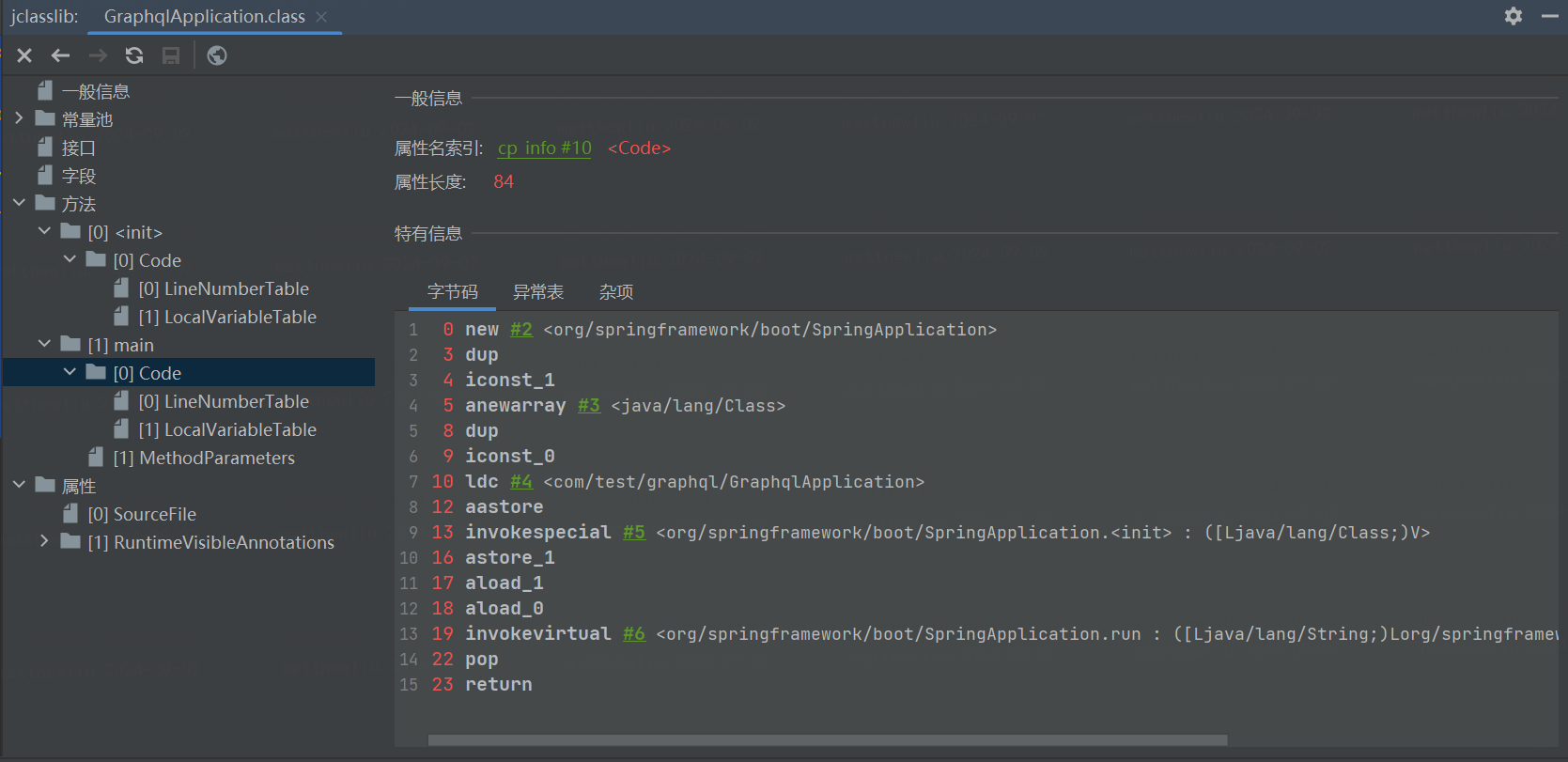字节码基础知识
Java在前期都是解释执行的,虚拟机一行一行的执行字节码指令(这部分和CPython很像)。后面才陆续加入编译执行,即时编译JIT那些。
下面是一段典型的Java程序。
package com.test.graphql;
import org.springframework.boot.SpringApplication;
import org.springframework.boot.autoconfigure.SpringBootApplication;
@SpringBootApplication
public class GraphqlApplication {
public static void main(String[] args) {
SpringApplication springApplication = new SpringApplication(GraphqlApplication.class);
springApplication.run(args);
}
}
编译后,class文件里的main函数字节码是这样的

图中第1行new对应字节码187 (0xbb),后面两个是参数。1,2,3行就是创建一个heap对象并且赋值给本地变量。13行invokespecial调用构造函数,19行调用虚函数,23行函数返回。
全部字节码已经有大概200个,在这个文件里
src\jdk.compiler\share\classes\com\sun\tools\javac\jvm\Code.java
完整的字节码规范可以看这里https://docs.oracle.com/javase/specs/jvms/se11/html/jvms-6.html
字节码解释执行
Hotspot虚拟机里为解释执行提供了两套Stub实现,CppInterpreter和TemplateInterpreter。前面是基于C++的,后面是基于汇编的。
虚拟机启动时会先初始化Stub代码块
void TemplateInterpreterGenerator::generate_all()
src\hotspot\share\interpreter\templateInterpreterGenerator.cpp
然后把Stub代码块和字节码对应起来
void TemplateTable::initialize()
src\hotspot\share\interpreter\templateTable.cpp
截取一小部分如下
// Java spec bytecodes ubcp|disp|clvm|iswd in out generator argument
def(Bytecodes::_nop , ____|____|____|____, vtos, vtos, nop , _ );
def(Bytecodes::_aconst_null , ____|____|____|____, vtos, atos, aconst_null , _ );
def(Bytecodes::_iconst_m1 , ____|____|____|____, vtos, itos, iconst , -1 );
def(Bytecodes::_iconst_0 , ____|____|____|____, vtos, itos, iconst , 0 );
def(Bytecodes::_iconst_1 , ____|____|____|____, vtos, itos, iconst , 1 );
def(Bytecodes::_iconst_2 , ____|____|____|____, vtos, itos, iconst , 2 );
def(Bytecodes::_iconst_3 , ____|____|____|____, vtos, itos, iconst , 3 );
def(Bytecodes::_iconst_4 , ____|____|____|____, vtos, itos, iconst , 4 );
def(Bytecodes::_iconst_5 , ____|____|____|____, vtos, itos, iconst , 5 );
def(Bytecodes::_lconst_0 , ____|____|____|____, vtos, ltos, lconst , 0 );
def(Bytecodes::_lconst_1 , ____|____|____|____, vtos, ltos, lconst , 1 );
def(Bytecodes::_fconst_0 , ____|____|____|____, vtos, ftos, fconst , 0 );
def(Bytecodes::_fconst_1 , ____|____|____|____, vtos, ftos, fconst , 1 );
def(Bytecodes::_fconst_2 , ____|____|____|____, vtos, ftos, fconst , 2 );
def(Bytecodes::_dconst_0 , ____|____|____|____, vtos, dtos, dconst , 0 );
def(Bytecodes::_dconst_1 , ____|____|____|____, vtos, dtos, dconst , 1 );
def(Bytecodes::_bipush , ubcp|____|____|____, vtos, itos, bipush , _ );
def(Bytecodes::_sipush , ubcp|____|____|____, vtos, itos, sipush , _ );
def(Bytecodes::_ldc , ubcp|____|clvm|____, vtos, vtos, ldc , false );
运行时的解释执行基本就是:一个大switch,按字节码顺序跳表调用Stub代码,具体见下面函数。
BlockEnd* GraphBuilder::iterate_bytecodes_for_block(int bci)
src\hotspot\share\c1\c1_GraphBuilder.cpp
函数对象nmethod
Java类的方法最终被编译成nmethod对象
jdk\src\hotspot\share\code\nmethod.hpp
nmethod继承自CompiledMethod,而CompiledMethod的父类是CodeBlob。
// nmethods (native methods) are the compiled code versions of Java methods.
//
// An nmethod contains:
// - header (the nmethod structure)
// [Relocation]
// - relocation information
// - constant part (doubles, longs and floats used in nmethod)
// - oop table
// [Code]
// - code body
// - exception handler
// - stub code
// [Debugging information]
// - oop array
// - data array
// - pcs
// [Exception handler table]
// - handler entry point array
// [Implicit Null Pointer exception table]
// - implicit null table array
class nmethod : public CompiledMethod {
...
}
可以看到nmethod上几乎没有关联的Java类和对象信息。它就是代码块和运行代码块的上下文。关联的Java对象是CodeBlob执行的一个普通参数。
在Java层是obj.method(args),在虚拟机内部是method(obj, args)
微信扫描下方的二维码阅读本文

0 Comments